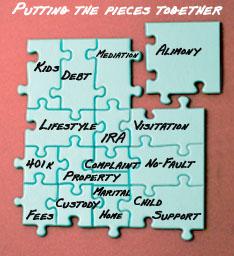Outline of Divorce Issues
- Legal Grounds for divorce

- Property division issues
- Spousal Support
- Child custody, support and maintenance matters
- Temporary Court orders
- Spouse’s Name
- Residency
- Mediation
1. Legal Grounds for Divorce
(1) Adultery, willful and continued desertion for 12 months, (2) extreme cruelty (after 3 months from the last act), (3) separation for 18 months and no reasonable prospect of reconciliation (“no fault”), (4) voluntarily induced addiction or habituation to drugs or habitual drunkenness for 12 months subsequent to marriage, (5) mental illness institutionalization for 24 consecutive months subsequent to marriage, (6) imprisonment for 18 consecutive months subsequent to marriage and the parties have not resumed cohabitation and (7) deviant sexual conduct by defendant spouse without the consent of the plaintiff.
2. Property Division Issues
New Jersey is an equitable distribution state. The Court may include in any decree of divorce or of separate maintenance appropriate provisions awarding to a party all or a portion of the property, either real or personal, owned by his or her spouse, as appears to the court to be equitable under all the circumstances of the case, if it appears from the evidence in the case that the party contributed to the acquisition, improvement, or accumulation of the property.
3. Spousal Support (Also Called Alimony)
Spousal Support may be requested by and granted to either party if the Court determines it to be just and proper. The alimony may be awarded if the property awarded to a spouse is insufficient to allow that spouse suitable support and maintenance. The Court shall determine the amount and the time period for the award of alimony. In making an award of alimony that is fair and equitable, the Court will consider all the relevant factors necessary, including, but not limited to:
- The actual need and ability of the parties to pay;
- The duration of the marriage;
- The age, physical and emotional health of the parties;
- The standard of living established in the marriage and the likelihood that each party can maintain a reasonably comparable standard of living;
- The earning capacities, educational levels, vocational skills, and employability of the parties;
- The length of absence from the job market of the party seeking maintenance;
- The parental responsibilities for the children;
- The time and expense necessary to acquire sufficient education or training to enable the party seeking maintenance to find appropriate employment, the availability of the training and employment, and the opportunity for future acquisitions of capital assets and income;
- The history of the financial or non-financial contributions to the marriage by each party including contributions to the care and education of the children and interruption of personal careers or educational opportunities;
- The equitable distribution of property ordered and any payouts on equitable distribution, directly or indirectly, out of current income, to the extent this consideration is reasonable, just and fair;
- The income available to either party through investment of any assets held by that party;
- The tax treatment and consequences to both parties of any alimony award, including the designation of all or a portion of the payment as a non-taxable payment; and
- Any other factors which the court may deem relevant in an uncontested divorce in New Jersey
4. Child Custody, Support and Maintenance Matters
Click here to find out about Child Custody and Visitation
Click here to find out about Child Support
5. Temporary Court Orders
A spouse may apply for the court to issue certain temporary orders such as:
- Order of protection;
- Disposal of property;
- Who will occupy the marital home?
- Child custody and visitation rights;
- Child support; and/or
- Spousal support.
6. Spouse’s Name
The Court may allow either party to resume any name used prior to marriage or to assume any surname, upon granting the divorce.
7. Residency
To get a divorce in New Jersey, either spouse must have been a resident of New Jersey for at least a year prior to filing suit. But if filing on the grounds of adultery either spouse must have been a resident of the state at any time prior to filing suit.
8. Mediation
Subject to court order in specific cases, mediation is voluntary and not necessarily required to get a divorce in New Jersey.


